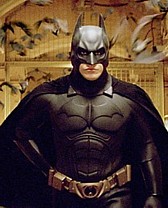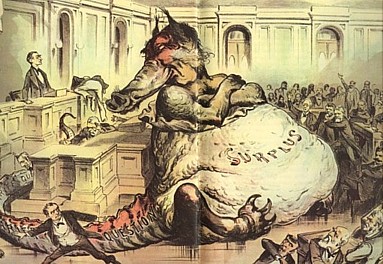
Previous William Thomas Sherman Info Page postings, quotes, observations, etc.
Again, in passing --
If I knew what my opponents serious arguments were or are supposed to be, believe me I would respond to them. This said, there are three main points I would especially direct your attention to:
1. They do, can, and have not been able to some up with a (regular) person to represent them, and so indeed do exist technically and legally only as phantoms, and as phantoms I cannot possibly take them seriously, and until they exist they cannot possibly claim victory.
2. If they think so little of these cruel and violent crimes they have committed (while forswearing repentance) then it is not implausible that the same can be done to them with even less scruple and impunity, and in proportion to the guilt or innocence of one of their victims. So, say, if a given victim is five points guilty and they a hundred, they would according to this speculation and as a matter of equity and parity be subjected to 95 times more suffering than their victim. Now it will be objected that one can't say the one will necessarily follow the other. This is very true, but I for one would not want to take the least chance risking such a thing myself.
3. These people vaunt themselves of their superiority, yet the simple fact is they have and do come to me; the reverse is and has never been the case, and I have no interest in these people whatsoever beyond what Christian charity requires. What then do they need to bother me for?
How many times could or did any given one of us when in desperate or trying circumstances, literally or in effect, cry aloud "Oh, how could God have abandoned me to this fate? (There is no justice.), etc." And yet, if that's what we say, what could any numbers of animals say or cry out if they could articulate the wrong (sometimes) done them? It is a very sobering thought, and reminds me of the quote (correctly or incorrectly) attributed to Schopenhauer that this world is the Hell of animals. If then you are such who is in dire straits that truly demand or deserve heavenly justice, identify and throw your lot in with the animals, as Christ did in identifying himself with a lamb, and wonder not "why me?" but "why them?"
I spent literally hours trying to locate this exchange from "The Phantom Menace" (that's also how I found the "Batman" video below) that I previously caught as a clip on television one time, and take my word for it, the later "Stars Wars" films are possibly the most boring, dreary, and depressing films ever made; certainly it would be cruel and unusual punishment to sentence someone to watch them; with story lines, characters, and values expressed that could only, in my opinion, have sprung from the creative imagination of someone afflicted with mind-control done them by the likes of the ghoulish magician. Anyway, here is that part of the script of one of these films I had been searching for, and to spare anyone else the ordeal of attempting to do the same.
Anakin: “Master, Sir...I heard Yoda talking about midi-chlorians. I’ve been wondering: What are midi-chlorians?”
Qui-Gon Jinn: “Midi-chlorians are a microscopic life form that resides within all living cells.”
Anakin: “They live inside me?”
Qui-Gon Jinn: “Inside your cells, yes. And we are symbionts with them.”
Anakin: “Symbionts?”
Qui-Gon Jinn: “Life forms living together for mutual advantage. Without midi-chlorians, life could not exist and we would have no knowledge of the Force. They continually speak to us, telling us the will of the Force. When you learn to quiet your mind, you’ll hear them speaking to you.”

Note how the ears here have become Shrek like antennae.
While I have mentioned it already a number of times before, the importance of the Newtonian principle of "for every action there is an equal and opposite reaction" cannot be emphasized enough to those resisting or combating Hell. You need to think that all and everything they do or may throw at you can through your own patience, self-discipline and perseverance be ultimately thrown right back at them (nor are you at any time to hold yourself blameable for any harm and injury a terrorist does or causes others; that is, unless you actually happen to be his accomplice; which, of course, you are not.) There are a variety of tricks to doing this which one can only learn on their feet (it would be too much of a task here to begin describing such at the moment), but the main idea is one of holding your own and keeping yourself in order. Early on it was typical of me to react in excited anger to their violent assaults, but as the years have gone by I've found that I fight better when I am more calm and detached in dealing with them; such that by this hour they are to me more like a very painful nuisance and baby-sitting charge than, but for their out-moneying and outnumbering me, a serious opponent.
With the completion of the 6th edition of Calendar and Record: 1780-1781 nearly in sight, I've begun undertaking what is intended as something of a substitute project, namely the sifting and going through original volumes and anthologies of early American literature circa 1750 to about 1830 of plays, poems, essays, novels, anecdotes, and critical reviews. What perhaps makes the genre so particularly interesting is the conflict American writers then bore between imitating British authors versus an understandable and pronounced desire to strike something new and independent; with the result being sometimes something fresh and novel, as well as elegant in its spirit; Charles Brockden Brown and Royall Tyler being good examples of this. Such that it is something of an adventure, and a fun one, looking for writings of that time which have this distinct, sometimes ethereal, quality of vision -- though granted there is much of lesser quality that requires digging through to get to these better works and pieces.
The following, to help illustrate some of these writings, is a poem written by Washington Irving's elder brother William (1786-1821), and that appears in Salmagundi (1807).
The Days of the Grogram Grandames
How oft in musing mood my heart recalls,
From gray-beard Father Time's oblivious halls,
The modes and maxims of my early day,
Long in those dark recesses stowed away:
Drags once more to the cheerful realms of light
Those buckram fashions, long since lost in night,
And makes, like Endor's witch, once more to rise
My grogram grandames to my raptured eyes!
Shades of my fathers! in your pasteboard skirts,
Your broidered waistcoats and your plaited shirts,
Your formal bag-wigs -- wide-extended cuffs,
Your five-inch chitterlings and nine-inch ruffs!
Gods! how ye strut, at times, in all your state,
Amid the visions of my thoughtful pate!
I see ye move the solemn minuet o'er,
The modest foot scarce rising from the floor;
No thundering rigadoon with boisterous prance,
No pigeon-wing, disturb your contre-danse,
But, silent as the gentle Lethe's tide,
Adown the festive maze ye peaceful glide!
Still in my mental eye each name appears—
Each modest beauty of departed years;
Close by mamma I see her stately march,
Or sit, in all the majesty of starch;
When for the dance a stranger seeks her hand,
I see her doubting, hesitating, stand, —
Yield to his claim with most fastidious grace,
And sigh for her intended in his place!
Oh, golden days; when every gentle fair
On sacred Sabbath conned with pious care
Her Holy Bible, or her prayer-book o'er,
Or studied honest Bunyan's drowsy lore;
Travelled with him the Pilgrim's Progress through,
And stormed the famous town of Man-Soul too:
Beat Eye-and Ear-gate up with thundering jar,
And fought triumphant through the Holy War;
Or if, perchance, to lighter works inclined,
They sought with novels to relax the mind,
'Twas Grandison's politely formal page,
Or Clelia or Pamela were the rage.
No plays were then — theatrics were unknown;
A learned pig — a dancing monkey shown —
The feats of Punch—a cunning juggler's sleight,
Were sure to fill each bosom with delight
An honest, simple, humdrum race we were,
Undazzled yet by fashion's wildering glare.

Displayed above is one more political cartoon from Puck. This, drawn by Joseph Keppler, appeared in the Dec. 7, 1887 issue, and was alluding to the then alarming surplus of tariff and custom duty revenue the Federal government by that time had accumulated; with questions raised respecting whom all this money was for and would be benefiting. Looking at this cartoon now, we might apply it to concerns more pertinent to our own day, such as where did all those Microsoft or else billion dollar movie career fortunes go? Or something similar.
Next in our stroll down memory lane is (for me certainly) one of the most interesting passages in Christian apocrypha, in his instance emanating from the so-called "Gospel of Nicodemus;" the full text of which can be found here. Although the work has been characterized by one scholar as one of a number of well meaning, pious frauds written for didactic purposes and that appeared in the very early church (as opposed to deliberately malicious gnostic apocrypha); as is sometimes the case with such works they may, in a given instance, be more historically accurate than we ourselves are in a position to determine. In any event, historically correct or no, I particularly like Christ's purported responses to Pilate, and so for the benefit of those who may or might feel likewise have reproduced them.
"[Chapter III]
"1. Then Pilate, filled with anger, went out of the hall, and said to the Jews, I call the whole world to witness that I find no fault in that man.
2 The Jews replied to Pilate, If he had not been a wicked person, we had not brought him before thee.
3 Pilate said to them, Do ye take him and try him by your law.
4 Then the Jews said, It is not lawful for us to put anyone to death.
5 Pilate said to the Jews, The command, therefore thou shalt not kill, belongs to you, but not to me.
6 And he went again into the hall, and called Jesus by himself, and said to him, Art thou the king of the Jews?
7 And Jesus answering, said to Pilate, Dost thou speak this of thyself, or did the Jews tell it thee concerning me?
8 Pilate answering, said to Jesus, Am I a Jew? The whole nation and rulers of the Jews have delivered thee up to me. What hast thou done?
9 Jesus answering, said, My kingdom is not of this world: if my kingdom were of this world, then would my servants fight, and I should not have been delivered to the Jews; but now my kingdom is not from hence.
10 Pilate said, Art thou a king then? Jesus answered, Thou sayest that I am a king: to this end was I born, and for this end came I into the world; and for this purpose I came, that I should bear witness to the truth; and every one who is of the truth, heareth my voice.
11 Pilate saith to him, What is truth?
12 Jesus said, Truth is from heaven.
13 Pilate said, Therefore truth is not on earth.
14 Jesus said to Pilate, Believe that truth is on earth among those, who when they have the power of judgment, are governed by truth, and form right judgment."
Later Note. A, for some, helpful reminder -- if he's the ghoulish magician then by definition he's not Jesus.